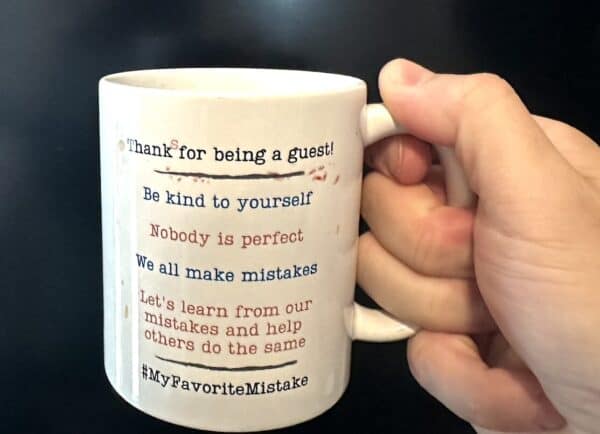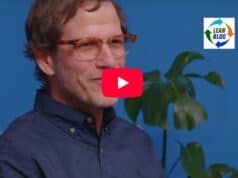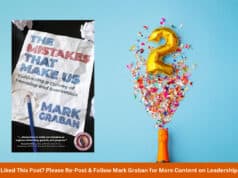Today, I want to share a section from my book, The Mistakes That Make Us. I'm sharing an excerpt here in this post and making it available as a podcast episode using an excerpt from the audiobook version.
In this book, I explore how mistakes can actually be one of the best ways we learn and grow–whether it's in business or life in general.
The excerpt I'm about to share is from Chapter Three, where I talk about the importance of kindness. Often, we think that being “nice” is enough, but real kindness goes deeper. It's not just about being pleasant or avoiding conflict; it's about helping others–and ourselves–grow and improve through constructive action.
Hear Mark read this post — subscribe to Lean Blog Audio
In this chapter, I also touch on self-kindness, especially after making mistakes. We tend to be our own harshest critics, but kindness towards ourselves is crucial if we want to learn and move forward.
If you find this excerpt helpful, I encourage you to check out the rest of the book, The Mistakes That Make Us (including this free sample offer). It's packed with stories and lessons on how embracing mistakes can lead to greater success. So, let's get into the reading.

“KIND” IS BETTER THAN “NICE”
Most people want to be nice. A nice leader, however, might avoid conflict by ignoring a mistake, or they might say, “Don't feel bad; it's not your fault.” Nice might be a touch better than screaming at yourself or punishing others. But does niceness help us prevent mistakes and improve performance?
Karyn Ross, the founder of The Love and Kindness Project Foundation, co-authored The Toyota Way to Service Excellence and most recently wrote The Kind Leader.
Karyn defines kindness as “an action (or set of actions) connecting a person's internal feelings of empathy and compassion . . . that is undertaken with the purpose of generating a positive effect and outcome for another,” and this also applies to yourself.
She emphasizes that kindness is helpful and effective. While niceness might include qualities like sympathy and politeness (or telling people what you think they want to hear), kindness is “focused on what will help the other person learn, grow, and improve.”
Her favorite mistake was losing a suitcase in Chicago's O'Hare International Airport terminal. Or maybe it was stolen. Why did this happen? What did she learn? Because of chronic shoulder pain, Karyn usually checked her suitcase. One time, she kept it with her. While waiting for her flight, Karyn was increasingly annoyed by a negative work conversation. Distracted by this and being out of her regular routine, Karyn's gate was changed, and she lost track of her bag in the process. It disappeared, and she never got it back.
“The universe took my suitcase to remind me we always have a choice.” Karyn says this mistake helped her realize that when we choose to stop focusing on negative and unkind thoughts and being frustrated by others' negativity or mistakes, we can be more present and aware in the current moment.
Karyn enjoyed the opportunity to replace her boring black suitcase, which looked like so many other travelers' bags, with one that was bright and colorful as a reminder that she could choose to be upbeat and kind.
Karyn reassured me that being kind doesn't always happen naturally for her–it's a choice. “We have a whole lifetime we've been given to practice and learn things. There are things that I've been working on since I was a child. I'm still working on them now.”
Continued after the video
Related Video:
Her thinking reminds me of the “growth mindset” concept, as explained in Carol Dweck's seminal book Mindset. With a growth mindset, we realize that we can practice kindness and get better at choosing it as an attitude or response. The “fixed mindset” alternative can be limiting because that view suggests one is inherently kind or not.
As we cultivate our ability to learn from mistakes, the growth mindset applies even better to the garden analogy. Instead of viewing ourselves as inherently good leaders (or not), a growth mindset encourages us to develop ourselves as leaders so we can cultivate others.
What is Karyn's advice for times when we make a mistake?
“At that moment, when your inner voice starts [with] all those unkind things, step out for a moment and ask, ‘If this happened to someone else, my friend, and they came to me and told me this, what would I say to them?' Chances are, what you're saying to yourself is not what you would say to them out loud. We have to think kindly, speak kindly, and act kindly to others, but we must [do so] to ourselves as well.”
Karyn told me, “We learn self-kindness by practicing empathy, compassion, and taking kind actions for others. The best way to learn to be kind to yourself is to deliberately practice kindness to others!” She told me, “The people around us at
home and work make mistakes all the time. We need not only to practice empathy and compassion but also to take action to help. Focusing on that teaches us to get out of ourselves and be kind to ourselves. We are just as imperfect.”
I've learned I can be kind to myself when I realize . . . I'm being unkind to myself after a mistake. I'm not looking to make excuses for being hard on myself, but to recognize it's a pretty normal thing to do. That awareness helps me focus on choosing kindness instead of dwelling on the times when I'm not.
Karyn inspired me to create a coffee mug with four short mantras. I often drink coffee, especially when recording My Favorite Mistake episodes. The podcast logo faces the camera and my guest, but I see the side that reads:
- Be kind to yourself
- Nobody is perfect
- We all make mistakes
- Let's learn from our mistakes and help others do the same
The mug helps me remember these things I know to be true. I notice my mistakes, for sure. But I've gotten better at pointing out the fact of the mistake (which can be helpful) without shaming myself (which is unkind and unhelpful).

Conclusion: Practice Kindness as a Daily Leadership Habit
Kindness isn't a soft skill–it's a powerful leadership capability. Whether you're managing a hospital unit, leading a manufacturing team, or mentoring someone early in their career, your response to mistakes sets the tone for learning, growth, and trust. The choice to be kind–to yourself and to others–creates space for improvement instead of fear.
So here's something actionable:
- Notice the next mistake that happens today. Pause before reacting.
- Ask yourself: “How would I respond if someone else made this mistake?”
- Respond with empathy. Act with kindness. Guide with intent.
Kindness doesn't mean avoiding accountability or sugarcoating the truth. It means facing mistakes head-on, not with blame, but with the intention to help people improve–including yourself.
If this resonates with you, you'll find more stories and practical takeaways in The Mistakes That Make Us–available now in print, ebook, and audiobook. Grab a free sample chapter or order your copy today.
And if you're interested in creating a workplace culture where learning from mistakes is the norm–not the exception–consider joining one of my upcoming workshops or bringing me in to speak with your leadership team.
Related Posts and Episodes:
Please scroll down (or click) to post a comment. Connect with me on LinkedIn.
If you’re working to build a culture where people feel safe to speak up, solve problems, and improve every day, I’d be glad to help. Let’s talk about how to strengthen Psychological Safety and Continuous Improvement in your organization.








